#Shafik
Text

The conflict over Columbia U's Gaza Solidarity Encampment pits an Egyptian-born school president against a student movement largely led by Arabs and Muslims protesting Israel's genocide in the besieged Gaza Strip. Goaded by Republican members of Congress and the Israel lobby, Columbia President Manouche Shafik has sicced the NYPD on the protesters, triggering mass arrests and suspensions of students for supposedly "trespassing" on their own campus.
Like so many contemporary Ivy League presidents, Shafik is not a scholar or academic. She currently serves on the board of the Bill and Melinda Gates Foundation, providing a patina of diversity to a supranational global governing entity guided by a single uber-billionaire. Prior to that, Shafik acted as deputy governor of the Bank of England, the UK bank that confiscated Venezuela's gold reserves under orders from the US government in 2019. She has also served in top roles at the IMF and World Bank, where global south debt becomes a point of leverage for Washington and London. Her own journey to the US began as a young child when Egypt's populist President Gamal Abdel-Nasser seized land from her wealthy father.
Shafik owes her entire career to the trans-Atlantic oligarchy, and has no space in which to defy it. She was not appointed as president of Columbia to instill values like critical thinking or academic freedom. She's there to raise hundreds of millions from her wealthy benefactors. Her leadership not only exemplifies the elite corruption of US universities, it exposes the sham of neoliberal diversity politics.
243 notes
·
View notes
Text
The banality of the face of evil is always strange, isn't it?
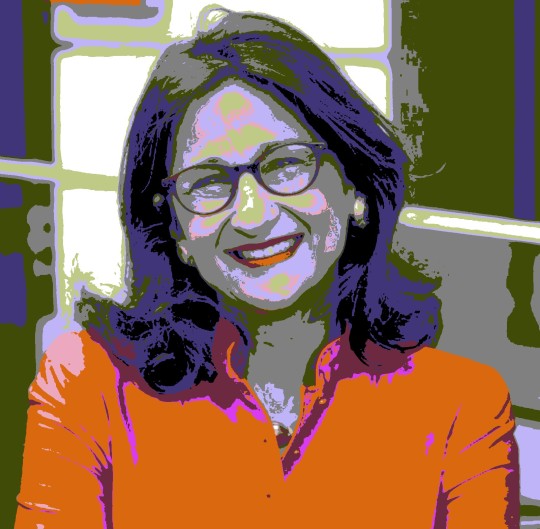
0 notes
Text
Vom größten Mythos der Reiseliteratur bis zum Traumziel, das er noch nicht gesehen hat, erzählt Autor Shafik Meghji uns von den Reisen, die ihn verändert haben
Als Teenager kam Shafik Meghji zu dem Schluss, dass er es als Fußballprofi nicht schaffen würde. Als solcher entschied er sich für das Nächstbeste: einen Job als umherziehender Sportreporter. Er gewann ein begehrtes Scott Trust Stipendium des Guardian, das sein Diplom in Zeitungsjournalismus finanzierte und zu einer Rolle beim Evening Standard führte.
Autor Shafik Meghji
Als er die aufeinanderfolgenden 5-Uhr-Schichten satt hatte, kündigte Shafik seinen Job, um mit seiner Freundin auf eine Weltreise zu gehen. Sie verbrachten ein Jahr mit dem Rucksack in Indien und Südamerika und besuchten Orte wie die Thar-Wüste, die Western Ghats, Patagonien und den Amazonas. Die Reise entfachte einen neuen Ehrgeiz, der wohl so hoch gesteckt ist wie der Profisport: seinen Lebensunterhalt als Reiseschriftsteller zu verdienen.
15 Jahre später hat Shafik über 40 Reiseführer verfasst, Preise für Schreiben und Fotografie gewonnen und zuletzt Crossed Off the Map veröffentlicht, ein von der Kritik gefeiertes Buch, das Reiseberichte, Geschichte und Reportagen verbindet, um die Geschichte Boliviens und seiner Länder zu erzählen unerwarteten Einfluss auf die ganze Welt.
Hier erzählt er uns, warum er sich für Bolivien entschieden hat (Spoiler: Bolivien hat ihn gewählt), warum Reiseberichte nicht so glamourös sind, wie andere denken, und warum er weiterhin hoffnungsvoll in die Zukunft des Reiseführers blickt.
Sie haben mehr als 40 Reiseführer mitverfasst. Sagen Sie uns: Was ist der größte Mythos im Reisejournalismus?
Es wird oft angenommen, dass Recherchereisen für Reiseautoren einfach verherrlichte Ferien sind, was leider nicht der Fall ist (zumindest nicht für die überwiegende Mehrheit der Zeit). Insbesondere die Arbeit an einem Reiseführer kann eine hektische Aktivität sein. Egal wie viel Sie recherchieren, es gibt immer jemanden zum Reden, eine andere Geschichte zum Ausgraben, einen zusätzlichen Ort zum Besuchen. Auch wenn es ein glamouröses Image haben mag, verbringt man doch unheimlich viel Zeit mit Warten an Flughäfen, Bahnhöfen und Busbahnhöfen oder an Bord des einen oder anderen Verkehrsmittels.
Du hast einen Traumjob. Können Sie sich an einen einzigen Glücksfall erinnern oder war es eher langsam und stetig?
Den Auftrag bekommen, an meinem ersten Reiseführer zu arbeiten. Nach dem Studium fing ich als Nachrichten- und Sportjournalistin beim Evening Standard an, aber nach und nach stellte sich das Fernweh ein. Meine damalige Freundin war reiselustig und nachdem ich die aufeinanderfolgenden 5-Uhr-Schichten endlich satt hatte, kündigte ich und wir machten eine Rucksacktour Indien und Südamerika. Es war die beste Entscheidung, die ich je getroffen habe.
Sean Pavone/Shutterstock Eine Reise nach Estland verschaffte Shafik seinen Durchbruch zum Reiseschreiben
Als ich nach London zurückkam, war ich fest entschlossen, Reiseschriftstellerin zu werden, und verbrachte ein Jahr damit, jeden Reiseverlag zu kontaktieren, der mir einfiel. Ich habe unzählige E-Mails verschickt, Unmengen von Beispielartikeln und Kapiteln geschrieben und unzählige Telefonate geführt.
Abgesehen von einer höflichen Absage von Lonely Planet bekam ich keine Antwort. Monate vergingen. Dann bekam ich aus heiterem Himmel eine E-Mail von Rough Guides. Ein neuer Redakteur war auf einen Brief gestoßen, den ich vor acht Monaten eingeschickt hatte, und lud mich zu einem Gespräch ein. Zwei Monate später brauchten sie jemanden, der kurzfristig nach Estland ging, um an „The Rough Guide to the Baltic States“ zu arbeiten. Ich ließ alles fallen und flog nach Tallinn. Das hat mir einen Fuß in die Tür gesetzt.
Erzählen Sie uns von der Reise, die Sie verändert hat. Welche Region oder Reise hat Sie am meisten beeinflusst?
Südamerika im Allgemeinen und Bolivien im Besonderen. Ich war auch schon immer ein eingefleischter
Leser und Kindheitsbücher über Orte wie den Amazonas und Patagonien und alte Kulturen wie die Inkas haben meine Fantasie gefangen genommen und nie wirklich losgelassen. Als ich schließlich den Kontinent besuchte und mit dem Rucksack von Brasilien über Bolivien, Peru und Chile nach Argentinien reiste, hatte dies einen seismischen Einfluss und inspirierte mich dazu, meine Karriere zu ändern und Reiseschriftsteller zu werden (spezialisiert auf Südamerika), um einige Jahre später nach Buenos Aires zu ziehen und schließlich mein erstes Buch schreiben, Crossed off the Map: Travels in Bolivia.
RPBaiao/Shutterstock Der Salar de Uyuni in Bolivien ist die größte Salzwüste der Welt
Vor dieser ersten Reise wusste ich nicht viel über Bolivien, aber nachdem ich durch Bolivien gereist war und die höchstgelegene Stadt der Welt, die größte Salzpfanne, die reichste Silbermine und den artenreichsten Nationalpark besucht hatte, war ich begeistert. Nachfolgende Recherchereisen für The Rough Guide to Bolivia ermöglichten es mir, dieses übersehene Land in einer Zeit großer politischer, sozialer und kultureller Veränderungen viel eingehender zu erkunden, als dies sonst möglich gewesen wäre. Ich habe auch von seinem tiefgreifenden und unerwarteten Einfluss auf die Welt in den letzten 500 Jahren erfahren – Fragmente der Geschichte, die außerhalb ihrer Grenzen weitgehend vergessen wurden.
Bolivien wird selten von Reisejournalisten oder den internationalen Medien behandelt, daher sah ich einen Platz für ein Buch, das sowohl seine faszinierende Geschichte als auch die Bewältigung einer Vielzahl aktueller Herausforderungen untersucht: Klimakrise, Populismus, Migration, Rechte der Ureinwohner, Urbanisierung und der „Krieg gegen die Drogen“.
Was ist die interessanteste Tatsache über Bolivien, die Sie während Ihrer Recherchen erfahren haben?
Eine meiner Lieblingsfakten betrifft den Parque Nacional Madidi: Er liegt im bolivianischen Amazonasgebiet und ist ungefähr so groß wie Wales. Er ist das artenreichste Schutzgebiet der Erde. Neben mehr als tausend Vogelarten – fast 10 % der weltweiten Gesamtzahl – beherbergt der Park eine Reihe von Jaguaren, Anakondas, Stachelrochen, Brillenbären und rosafarbenen Flussdelfinen, die als Bufeos bekannt sind.
Emiliano Barbieri/Shutterstock Der Parque Nacional Madidi ist einer der artenreichsten Orte der Erde
Sie waren auf allen sieben Kontinenten. Haben Sie noch ein Traumziel, das Sie noch nicht gesehen haben?
Das Tolle am Reisen ist, dass es kein Ende gibt. Egal, wie viele Orte Sie besuchen, es gibt immer etwas Neues zu entdecken. Ich würde gerne nach Zentralasien und Westafrika reisen, zwei Regionen, von denen ich in der Vergangenheit kaum an der Oberfläche gekratzt habe.
Hotel oder Hostel (oder Camping)?
Ich habe einige wundervolle, gesellige Erfahrungen in Hostels gemacht und Nächte in einigen unglaublichen Hotels verbracht, aber zweifellos ist mein Lieblingsort Shergarh, ein Camp aus luxuriösen Safarizelten auf einer Waldlichtung am Rande des Kanha-Nationalparks, ein Tiger Reserve in Madhya Pradesh, Indien. Abgesehen von der Tierwelt und der Landschaft ist es ein unglaublich ruhiger, einladender und atmosphärischer Ort.
Trevor Scouten/Shutterstock Ein neugieriger männlicher Tiger im Kanha-Nationalpark
Was halten Sie als Reiseführerautor von den Schlagzeilen „Reiseführer sind tot“, die alle paar Jahre wieder auftauchen?
Seit ich Ratgeber schreibe – seit fast 15 Jahren – gibt es große Ankündigungen über ihr bevorstehendes Ende. Während sie sich offensichtlich an veränderte Geschmäcker, Bedürfnisse und Umstände anpassen und weiterentwickeln müssen – einige Verlage haben sich als geschickter bei der Bewältigung dieser Herausforderungen erwiesen als andere – ist das Genre selbst bemerkenswert widerstandsfähig. Reiseführer gibt es in der einen oder anderen Form schon seit Jahrhunderten, und obwohl sich Format, Inhalt und Schwerpunkt ändern könnten, glaube ich nicht, dass sie schon wieder verschwinden werden.
Was war Ihr wichtigstes Reiseerlebnis?
Meine Antwort auf diese Frage ändert sich ständig: Derzeit ist es ein Wackeln zwischen dem ersten Betreten der Antarktis oder dem Segeln um die Galápagos.
Shafik Meghji Shafik Meghji in der Antarktis
Schließlich, warum reisen?
Grundsätzlich finde ich Reisen eine unglaublich lohnende, herausfordernde und belebende Erfahrung. Meine Arbeit bringt mich ständig in Kontakt mit neuen Menschen, Orten, Ideen und Erfahrungen, während ich meiner Neugier und Rastlosigkeit fröne.
Über den reinen Genuss hinaus kann Reiseliteratur – im besten Fall – den Lesern einen Einblick in andere Kulturen, Glaubensrichtungen und Lebensweisen bieten, Kontext schaffen, Vorurteile untergraben und Verständnis fördern – etwas, das sich derzeit besonders dringend anfühlt. Und für mich geht es auch darum, sich unbeirrt mit globalen Themen wie der Klimakatastrophe und ihren Auswirkungen auf Menschen und Gemeinschaften auseinanderzusetzen.
Crossed off the Map: Travels in Bolivia verbindet Reiseberichte, Geschichte und Reportage und reist von den Anden bis zum Amazonas, um Boliviens tiefgreifenden und unerwarteten Einfluss auf die ganze Welt in den letzten 500 Jahren zu erforschen – Fragmente der Geschichte, die außerhalb ihrer Grenzen weitgehend vergessen sind.
Titelbild: Schabkunst/Shutterstock
.
0 notes
Text
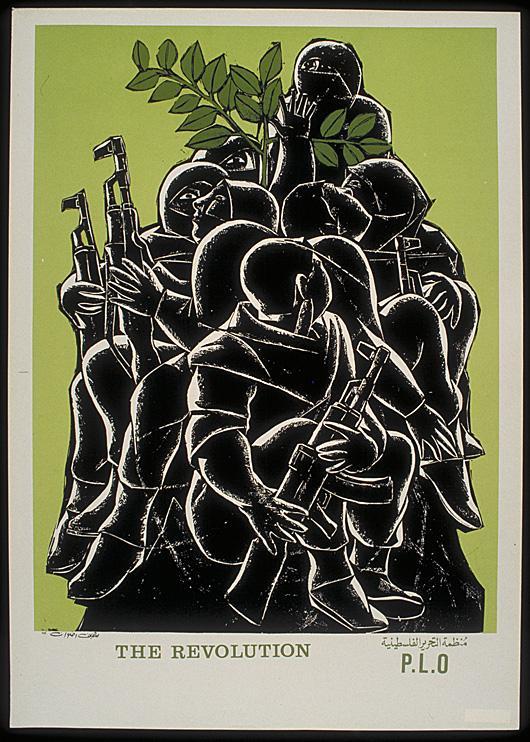
Radwan, Shafik. The Revolution. 1967.
101 notes
·
View notes
Text

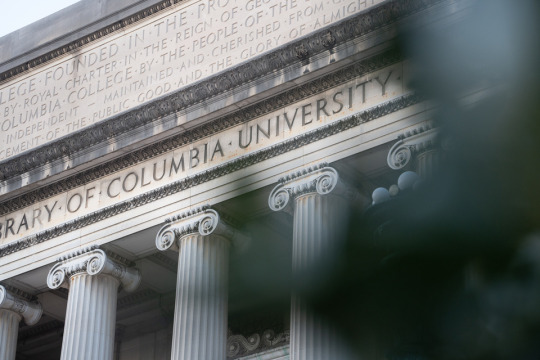
Dear President Shafik,
We write as Jewish faculty of Columbia and Barnard in anticipation of your appearance before the House Committee on Education and the Workforce on April 17, where you are expected to answer questions about antisemitism on campus. Based on the committee’s previous hearings, we are gravely concerned about the false narratives that frame these proceedings to entrap witnesses. We urge you, as the University president, to defend our shared commitment to universities as sites of learning, critical thinking, and knowledge production against this new McCarthyism.
Rather than being concerned with the safety and well-being of Jewish students on campuses, the committee is leveraging antisemitism in a wider effort to caricature and demonize universities as hotbeds of “woke indoctrination.” Its opportunistic use of antisemitism in a moment of crisis is expanding and strengthening longstanding efforts to undermine educational institutions. After launching attacks on public universities from Florida to South Dakota, this campaign has opened a new front against private institutions.
The prospect of Rep. Elise Stefanik, a member of congress with a history of espousing white nationalist politics, calling university presidents to account for alleged antisemitism on their campuses reveals these proceedings as disingenuous political theater.
In the face of these coordinated attacks on higher education, universities must insist on their freedom to research and teach inconvenient truths. This includes historical injustices and the contemporary structures that perpetuate them, regardless of whether these facts are politically inexpedient for certain interest groups.
To be sure, antisemitism is a grave concern that should be scrutinized alongside racism, sexism, Islamophobia, homophobia, and all other forms of hate. These hateful ideologies exist everywhere and we would be ignorant to believe that they don’t exist at Columbia. When antisemitism rears its head, it should be swiftly denounced, and its perpetrators held to account. However, it is absurd to claim that antisemitism—“discrimination, prejudice, hostility or violence against Jews as Jews,” according to the Jerusalem Declaration’s definition—is rampant on Columbia’s campus. To argue that taking a stand against Israel’s war on Gaza is antisemitic is to pervert the meaning of the term.
Labeling pro-Palestinian expression as anti-Jewish hate speech requires a dangerous and false conflation of Zionism with Jewishness, of political ideology with identity. This conflation betrays a woefully inaccurate understanding—and disingenuous misrepresentation—of Jewish history, identity, and politics. It erases more than a century of debates among Jews themselves about the nature of a Jewish homeland in the biblical Land of Israel, including Israel’s status as a Jewish nation-state. It dismisses the experiences of the post-Zionist, non-Zionist, and anti-Zionist Jews who work, study, and live on our campus.
The political passions that arise from conflict in the Middle East may deeply unsettle students, faculty, and staff with opposing views. But feeling uncomfortable is not the same thing as being threatened or discriminated against. Free expression, which is fundamental to both academic inquiry and democracy, necessarily entails exposure to views that may be deeply disconcerting. We can support students who feel real and valid discomfort toward protests advocating for Palestinian liberation while also stating clearly and firmly that this discomfort is not an issue of safety.
As faculty, we dedicate ourselves and our classrooms to keeping every student safe from real harm, harassment, and discrimination. We commit to helping them learn to experience discomfort and even confrontation as part of the process of skill and knowledge acquisition—and to help them realize that ideas we oppose can be contested without being suppressed.
By exacting discipline, inviting police presence, and broadly surveilling its students for minor offenses, the University is betraying its educational mission. It has pursued drastic measures against students, including disciplinary proceedings and probation, for infractions like allegedly attending an unauthorized protest, or moving barricades to drape a flag on a statue. Real harassment and physical intimidation and violence on campus must be confronted seriously and its perpetrators held accountable. At the same time, the University should refrain whenever possible from using discipline and surveillance as means of addressing less serious harms, and should never use punitive measures to address conflicts over ideas and the feelings of discomfort that result. Where the University once embraced and defended students’ political expression, it now suppresses and disciplines it.
The University’s recent policies represent a dramatic change from historical practice, and the consequences are ruinous to our community and its principles. In the past, Columbia has periodically confronted attacks against pro-Palestinian speech, ranging from the vile slanders against Professor Edward Said to the reckless accusations from the David Project. But where for decades the University stood firm against smear campaigns targeting its professors, it has now voluntarily accepted the job of censoring its faculty in and outside the classroom.
Columbia’s commitment to free inquiry and robust disagreement is what makes it a world-class institution. Limiting academic freedom when it comes to questions of Israel and Palestine paves the way for limitations on other contested topics, from climate science to the history of slavery. What’s more, students must have the freedom to dissent, to make mistakes, to offend without intent, and to learn to repair harm done if necessary. Free expression is not only crucial to student development and education outside the classroom; the tradition of student protest has also played a vital role in American democracy. Columbia should be proud of having participated in nationwide student organizing that helped secure civil rights and reproductive rights and helped bring an end to the Vietnam War and apartheid in South Africa.
We express our support for the University and for higher education against the attacks likely to be leveled against them at the upcoming congressional hearing. We object to the weaponization of antisemitism. And we advocate for a campus where all students, Jewish, Palestinian, and all others, can learn and thrive in a climate of open, honest inquiry and rigorous debate.
Many members of our University community share our perspective, but they have not yet been heard. Columbia students, staff, alumni, and faculty can sign here to show your support for this letter’s message.
—Jewish faculty reject the weaponization of antisemitism
The 23 authors of this letter are Jewish faculty members of Barnard College and Columbia University. This letter derives from a much longer one by these same 23 faculty sent to President Shafik on April 5.
#politics#palestine#israel#columbia university#antisemitism#anti zionisim#antizionism#weaponized antisemitism#minouche shafik#anti zionism ≠ antisemitism#zionism#rafah#gaza#white supremacy#racism#barnard college#protests#israel is a terrorist state#war crimes#ethnic cleansing#weaponized identity politics#colonialism#imperialism#student protests#human rights#human rights violations#bds#boycott divest sanction#hasbara#idpol
86 notes
·
View notes
Text
Suggested Listening: Columbia Protests (as of 4/25/24)
Alright, folks, I've seen a couple different approaches to this situation, and I think there's something to be learned from each of the below. I know some of them have a contested reputation, but all media sources have a bias and I will be including some context on those biases.
The podcasts I'm sharing are:
The Daily (New York Times)
The Take (Al Jazeera)
Democracy Now! (independent radio broadcast)
Global News Podcast (BBC Radio)
It's come up a few times on NPR as well, but not in enough detail for me to include. I will be linking Spotify, but these are all available elsewhere, though official transcripts can take several days.
The Daily - April 25th, 2024: This podcast is a production of The New York Times. The paper is left-leaning, but has a noted bias towards Israel, and has run into trouble on trans issues in the recent past. The podcast is further left, though still more cautiously moderate than something like Democracy Now; the podcast has previously been responsible for fact checks against the more biased NYT opinion pieces.*
Why you should listen to it: This episode provides the most comprehensive timeline to what has happened, in what order, and why certain actions have been taken. It is notably more sympathetic to Columbia University President Shafik than other coverage, though that may just be the natural result of explaining the current political pressures. It is still more sympathetic to the protesters than to her, but I do think this is helpful for establishing a timeline of events. It is not the only one, and I will share another below.
* That infamous article about the alleged systemic sexual violence that Hamas committed on Oct. 7th was put through a fact checker by the podcast team when it came time to do an episode about it, and the inability to substantiate it led to not only the episode being cancelled, but the article itself being (quietly) edited to note that it was not substantiated. The NYT did not handle it well, but I want to make it clear that the podcast team is independent in many respects, and while I've taken issue with some of their episodes, they often have more comprehensive coverage of certain matters.
The Take - April 25th, 2024: This is a podcast from the English-speaking branch of Al Jazeera, a Qatari news organization that, while independent, does receive a certain amount of funding from the Qatari government. By that measure, I do hesitate to place it on a left-right scale due to existing outside the Western political spectrum. As a Middle Eastern, Arab news org, Al Jazeera provides a perspective much closer to the action than others, and one that is generally much more sympathetic to Muslim and Arab voices. It is also, like the others on this list, an award-winning journal. At this time, Al Jazeera is considered one of the most reliable news sources for information on what is happening in Gaza, through their Palestinian correspondents; they have also been banned in Israel as antisemitic propaganda.
I need to make it very clear that I am not in any way denigrating it for having Qatari government funding; the BBC shares many of those factors, just British.
Why you should listen to it: Al Jazeera got a reporter into the student protest encampment in Columbia, and got more direct interviews with some of the students on the ground. This is part two of their coverage of the protests; Part One (April 24th, 2024)provides another perspective of the timeline, which focuses on different factors, generally closer to the events in Columbia than the national factors.
Democracy Now! - April 23rd, 2024: This is a far left/progressive radio broadcast (repackaged for podcast streaming) that has been running since 1996. They often have interviews with people that I haven't necessarily seen other podcasts bring in, and while I would not consider them extreme, I do sometimes find that certain details get left out in pursuit of a more black-and-white narrative.
Why you should listen to it: Cohost Juan González has been in the field of progressive journalism for a very long time, but it's more relevant than ever for this episode: González was one of the original organizers for the 1968 Columbia protests that resulted in one of the largest mass arrests in NYPD history. The 1968 protests were massive, and deeply impactful on a national scale. González's perspective on how this current protest compares to the one he helped organize nearly sixty years ago is a fascinating way to think about the current events.
Global News Podcast - April 25th, 2024: BBC is a very centrist source for journalism, funded primarily by the UK government and advertising. As such, their coverage tends to lean in favor of the current party, though they do not 'toe the party line' as such. They do regularly platform right-wing activists, but they also have correspondents in the Middle East with a more progressive perspective. I would compare them to CNN in the US; ineffective in terms of opinion, and comparatively milquetoast on that front, but capable of getting access to high-level events that smaller networks aren't.
Why you should listen to it: ...honestly, this is just a 'round it out' kind of suggestion, to get an idea of what the international community is thinking of the events at Columbia. I don't think they necessarily contribute much in terms of factual discovery, but it helps with getting the lay of the land.
#phoenix politics#current events#gaza#palestine#pro palestine#united states#new york#nyc#new york city#new york times#nyt#the daily#the take#al jazeera#democracy now#juan gonzalez#bbc#bbc global news#podcasts#columbia#university of columbia#Minouche Shafik
81 notes
·
View notes
Text

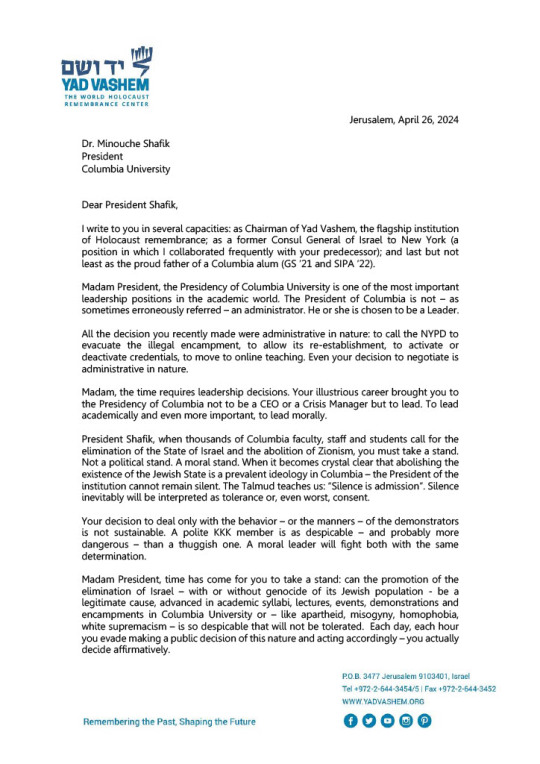
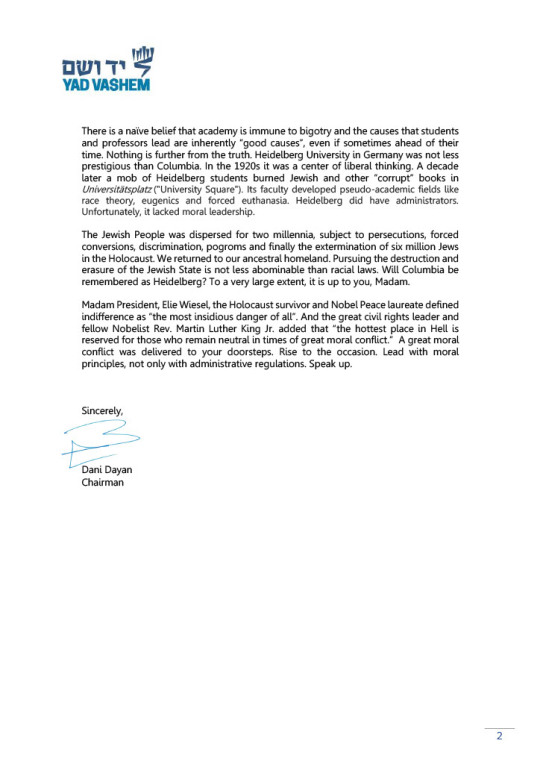
H/T @scartale-an-undertale-au
30 notes
·
View notes
Text
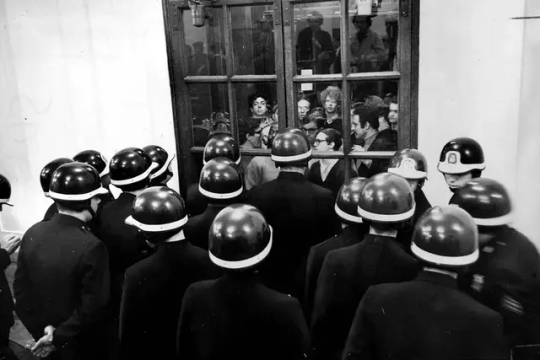


(2024)
APRIL 1968..#ColumbiaUniversity In 1968, students occupied buildings and hundreds were arrested. Credit...Larry C. Morris/ TheNewYorkTimes
A protest 56 years ago became an important part of Columbia’s culture.
During the Vietnam War, students seized campus buildings for a week until university officials and the police cracked down.

By Vimal Patel April 18, 2024
Columbia University is no stranger to major student protests, and the uproar that unfolded at the institution on Thursday had echoes of a much bigger revolt in 1968 — another time of upheaval over a war many students deeply believed was immoral.
That year, in April, in the throes of the Vietnam War, Columbia and Barnard students seized five campus buildings, took a dean hostage and shut down the university.
By April 30, a week after the protest started, university officials cracked down.
At about 2 a.m., police began clearing students from Hamilton Hall “after entering the building through underground tunnels,” according to the student newspaper, The Columbia Daily Spectator. Minutes later, police entered Low Library, again through tunnels, removing occupying students by force.
By 4 a.m., they had cleared all buildings, resulting in more than 700 arrests — one of the largest mass detentions in New York City history — and 148 reports of injuries, the student newspaper reported. Officers trampled protesters, hit them with nightsticks, punched and kicked them and dragged them down stairs, according to a New York Times report.
Most of the injuries were cuts and bruises, relatively minor as compared to some of the brutal arrests of protesters at the height of antiwar and civil rights demonstrations at the time. The university also sustained some property damage, including smashed furniture, toppled shelves and broken windows.
In the end, the protesters won their goals of stopping the construction of a gym on public land in Morningside Park, cutting ties with a Pentagon institute doing research for the Vietnam War and gaining amnesty for demonstrators.
The protests would also lead to the early resignations of Columbia’s president, Grayson L. Kirk, and its provost, David B. Truman.
The fallout from the violence hurt the university’s reputation and led to reforms favoring student activism. Today the university touts its tradition of protest as part of its brand.
On Thursday, another Columbia president, Nemat Shafik, took what she called an “extraordinary step” and authorized the New York Police Department to clear out a student encampment on campus.
#NEMAT SHAFIK#gaza#free gaza#1968#april 2024#jerusalem#tel aviv#Israel#BDS#WAR ON GAZA#free palestine#PALESTINE NEWS#UCLA#nyc#NYPD#friday#Good Friday#FREE#art#artist#contemporary art#history#world history#NEWS#updates#columbia university#pulitzer#WAR#vietnam war#students
23 notes
·
View notes
Text
by Marc B. Shapiro
Shafik must have breathed a sigh of relief when she saw what became of her colleagues after their disastrous testimony. She likely reflected on how she easily could have been in the same sinking boat. One would think she would have used this as an opportunity to learn an important lesson and set Columbia on the right path.
It seems that one would be wrong, given that, this semester, Columbia’s Middle East Institute chose to employ Mohamed Abdou as a visiting professor.
Abdou has openly stated that he supports Hamas, the genocidal terror organization that has engaged in mass murder and plans to continue doing so. For good measure, he has also stated that he supports Hezbollah and Islamic Jihad. Yet this was not a bar to his appointment at Columbia.
This is striking, because we live at a time when it is inconceivable that anyone who is known to be transphobic or racist would ever be offered an appointment at Columbia. Yet it appears that the university does not consider it overly problematic to support the murder of Jews.
Unfortunately, this isn’t surprising. As we have seen so often over the past few months, when it comes to hatred of minority groups, progressives’ one acceptable exception is the Jews.
Abdou’s appointment would be noteworthy at any time, but coming so soon after the college presidents’ horrendous testimony and as antisemitism, often disguised as anti-Zionism, continues to explode on college campuses, it is mind-boggling in its tone-deafness.
26 notes
·
View notes
Text
by Jessica Costescu
Student protesters at Columbia University are promising a "summer of disruption," with the school's Students for Justice in Palestine chapter outlining its plans for "student intifada" in a statement issued after the group erected another unauthorized encampment during an alumni reunion weekend.FreeBeacon
The statement, posted to Instagram Sunday evening, includes a commitment from the group's student leaders to "continue strategic, targeted attacks on all aspects of university life" as part of a "revolt for Rafah."
"There will be no business as usual during a genocide. … Paralyze all aspects of the university until the genocide and our complicity in it stops," the student group wrote. "As we continue our summer of disruption, we ask that every student, and our wider community, does the same. Use this time to agitate, educate, and escalate."
"Until victory and with more installations to come, revolt for Rafah—long live the student intifada."
The call to "escalate" came two days after members of the student group launched yet another anti-Israel encampment on the school's main lawn. An entrance to the encampment was furnished with a sign declaring, "We're back, bitches," which greeted alumni as they returned to campus on Friday for class reunions. Student protesters also unveiled a cardboard missile plastered with photos of Columbia president Minouche Shafik and other university leaders, including David Greenwald, the co-chairman of the school's board of trustees, and Abigail Black Elbaum, the vice chairwoman of the board.

14 notes
·
View notes
Text
MADINA TOURÉ and IRIE SENTNER at Politico:
NEW YORK — Speaker Mike Johnson said he will call Joe Biden and demand the president send the National Guard to Columbia University — an escalation after protesters constantly shouted him and other Republicans down during a visit to the campus Wednesday.
Johnson, flanked by GOP lawmakers from New York and elsewhere, repeated his calls for the university’s embattled president to step down. But protesters shouted “who are you people?” “Mike, you suck!” and chanted “free Palestine,” making it almost impossible for the gaggle of reporters and others to hear the speaker.
“This is dangerous. This is not the First Amendment, this is not free expression,” Johnson said.
He later added: “If this is not contained quickly and if these threats and intimidation are not stopped, there is an appropriate time for the National Guard.”
Johnson directly faced the Gaza Solidarity Encampment that has thrown the Ivy League campus into turmoil over the past week — demonstrations that have drawn bipartisan anger over incidents of antisemitism. Johnson earlier in the day called Columbia President Minouche Shafik a “weak and inept leader” who can’t guarantee the safety of Jewish students during a radio interview.
While he’s the most senior elected official so far to push for Shafik’s resignation, numerous Republican lawmakers — including New York’s GOP delegation — and at least one Democrat, Sen. John Fetterman (D-Pa.), are also pushing for her ouster.
“My message to the students inside the encampment is go back to class and stop the nonsense,” Johnson said. “Stop wasting your parents’ money.”
Johnson’s comments Wednesday capped off a week of chaos at the school that started when Shafik and other university leadership testified before House lawmakers, followed by her calling in police to arrest around 100 pro-Palestinian demonstrators who had camped out on campus. The protests and arrests spawned similar demonstrations at NYU, Yale, MIT and beyond and have become the latest domestic flashpoint in the ongoing Israel-Hamas conflict.
“Columbia University is in a free fall,” House Education Committee Chair Virginia Foxx (R-N.C.) said Wednesday, accusing Shafik of presenting false testimony during the hearing.
“I have a message for President Shafik and a message for you all too: The inmates are running the asylum,” she added.
[...]
Rep. Jamaal Bowman (D-N.Y.) — who has accused Columbia of bowing to “right wing pressure” with its arrests of students — dubbed Johnson’s visit as another tactic in a conservative attack on educational institutions and an effort to silence “anti-war and pro-Palestinian sentiment.”
Yesterday, Speaker Mike Johnson (R-LA) was hellbent on making Kent State look like a picnic by demanding President Biden call in the National Guard to quell pro-Palestinian protests on campuses nationwide. Speaker Johnson got deservedly shut down by protesters.
See Also:
HuffPost: Speaker Johnson To Columbia Protestors: 'Go Back To Class And Stop The Nonsense'
#Israel/Hamas War#Israel/Hamas War Protests#Ceasefire NOW#Ceasefire NOW Protests#Mike Johnson#Columbia University#National Guard#Minouche Shafik#John Fetterman#Israel Apartheid#Gaza Solidarity Encampment#Virginia Foxx#Kathy Hochul#Jamaal Bowman#Campus Protests
12 notes
·
View notes
Text
A group of billionaires and business titans working to shape U.S. public opinion of the war in Gaza privately pressed New York City’s mayor last month to send police to disperse pro-Palestinian protests at Columbia University, according to communications obtained by The Washington Post and people familiar with the group.
Business executives including Kind snack company founder Daniel Lubetzky, hedge fund manager Daniel Loeb, billionaire Len Blavatnik and real estate investor Joseph Sitt held a Zoom video call on April 26 with Mayor Eric Adams (D), about a week after the mayor first sent New York police to Columbia’s campus, a log of chat messages shows. During the call, some attendees discussed making political donations to Adams, as well as how the chat group’s members could pressure Columbia’s president and trustees to permit the mayor to send police to the campus to handle protesters, according to chat messages summarizing the conversation.
...The messages describing the call with Adams were among thousands logged in a WhatsApp chat among some of the nation’s most prominent business leaders and financiers, including former Starbucks CEO Howard Schultz, Dell founder and CEO Michael Dell, hedge fund manager Bill Ackman and Joshua Kushner, founder of Thrive Capital and brother of Jared Kushner, former president Donald Trump’s son-in-law.
..
The chat group formed shortly after the Oct. 7 attack, and its activism has stretched beyond New York, touching the highest levels of the Israeli government, the U.S. business world and elite universities. Titled “Israel Current Events,” the chat eventually expanded to about 100 members, the chat log shows. More than a dozen members of the group appear on Forbes’s annual list of billionaires; others work in real estate, finance and communications.
Overall, the messages offer a window into how some prominent individuals have wielded their money and power in an effort to shape American views of the Gaza war, as well as the actions of academic, business and political leaders — including New York’s mayor.
..Months before the protests at Columbia this spring, some chat members attended private briefings with former Israeli prime minister Naftali Bennett; Benny Gantz, a member of the Israeli war cabinet; and Israel’s ambassador to the United States, Michael Herzog, according to chat records....From the start of the chat, members sought guidance and information from officials in the Israeli government.
..
In the chat, discussion turned to the fact that Columbia had to grant Adams permission before he could send city police to the campus.
One member asked if the group could do anything to pressure Columbia trustees to cooperate with the mayor. In reply, former congressman Ted Deutch (D-Fla.), CEO of the American Jewish Committee, shared a PDF of a letter his organization had sent that day to Columbia President Minouche Shafik calling on her to “shut these protests down.”
Business titans privately urged NYC mayor to use police on Columbia protesters, chats show
A WhatsApp chat started by some wealthy Americans after the Oct. 7 Hamas attack reveals their focus on Mayor Eric Adams and their work to shape U.S. opinion of the Gaza war.
By Hannah Natanson and
Emmanuel Felton
May 16, 2024 at 3:15 p.m. EDT
#palestine#free palestine#gaza#isreal#colonization#genocide#apartheid#american imperialism#us politics#settler colonialism#settler violence#gaza solidarity encampment#solidarity encampments#student protests#student activism#columbia university#nypd#eric adams#minouche shafik
4 notes
·
View notes
Text
Hell is hot but wherever Columbia President Minouche Shafik goes when she dies is probably hotter.
#wkcr#columbia#palestine#Minouche Shafik needs to resign#she called NYPD TWICE on her students#fuck admin#fuck all university admin#abolish university admin
6 notes
·
View notes
Text

2 notes
·
View notes
Text








4 notes
·
View notes
Text
CU’s president asked the university senate’s executive committee, about bringing in the NYPD, they voted no; she did it anyway. Those that participated in the demonstration, weren’t suspended because of their participation, but because they were arrested.
Reel from Democracy Now -
instagram
#columbia university#demonstration#divestment#israel#nypd#minouche shafik#Prof Joseph Slaughter#democracy now#Amy Goodman#Instagram
3 notes
·
View notes